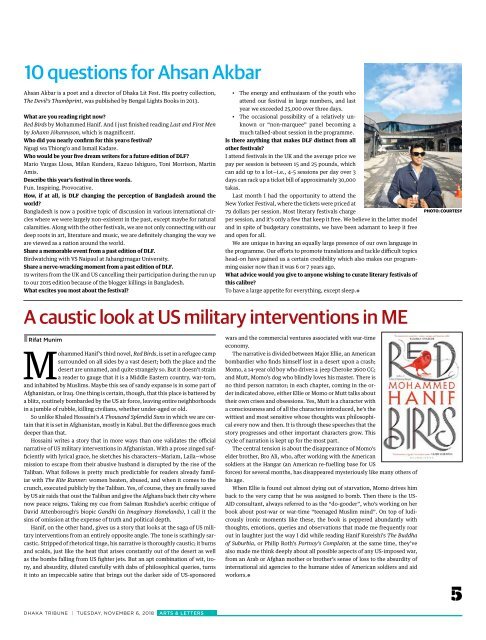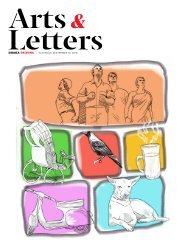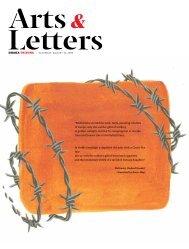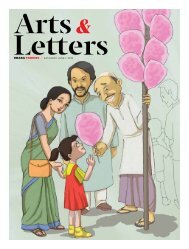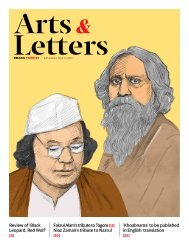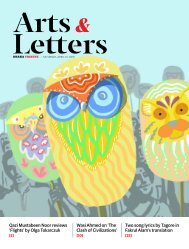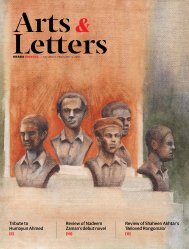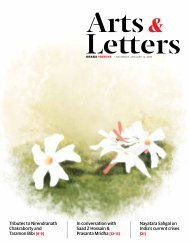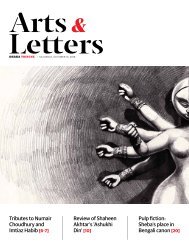A&L Nov_2018
You also want an ePaper? Increase the reach of your titles
YUMPU automatically turns print PDFs into web optimized ePapers that Google loves.
10 questions for Ahsan Akbar<br />
Ahsan Akbar is a poet and a director of Dhaka Lit Fest. His poetry collection,<br />
The Devil’s Thumbprint, was published by Bengal Lights Books in 2013.<br />
What are you reading right now?<br />
Red Birds by Mohammed Hanif. And I just finished reading Last and First Men<br />
by Johann Jóhannsson, which is magnificent.<br />
Who did you nearly confirm for this year›s festival?<br />
Ngugi wa Thiong’o and Ismail Kadare.<br />
Who would be your five dream writers for a future edition of DLF?<br />
Mario Vargas Llosa, Milan Kundera, Kazuo Ishiguro, Toni Morrison, Martin<br />
Amis.<br />
Describe this year’s festival in three words.<br />
Fun. Inspiring. Provocative.<br />
How, if at all, is DLF changing the perception of Bangladesh around the<br />
world?<br />
Bangladesh is now a positive topic of discussion in various international circles<br />
where we were largely non-existent in the past, except maybe for natural<br />
calamities. Along with the other festivals, we are not only connecting with our<br />
deep roots in art, literature and music, we are definitely changing the way we<br />
are viewed as a nation around the world.<br />
Share a memorable event from a past edition of DLF.<br />
Birdwatching with VS Naipaul at Jahangirnagar University.<br />
Share a nerve-wracking moment from a past edition of DLF.<br />
19 writers from the UK and US cancelling their participation during the run up<br />
to our 2015 edition because of the blogger killings in Bangladesh.<br />
What excites you most about the festival?<br />
• The energy and enthusiasm of the youth who<br />
attend our festival in large numbers, and last<br />
year we exceeded 25,000 over three days.<br />
• The occasional possibility of a relatively unknown<br />
or “non-marquee” panel becoming a<br />
much talked-about session in the programme.<br />
Is there anything that makes DLF distinct from all<br />
other festivals?<br />
I attend festivals in the UK and the average price we<br />
pay per session is between 15 and 25 pounds, which<br />
can add up to a lot—i.e., 4-5 sessions per day over 3<br />
days can rack up a ticket bill of approximately 30,000<br />
takas.<br />
Last month I had the opportunity to attend the<br />
New Yorker Festival, where the tickets were priced at<br />
79 dollars per session. Most literary festivals charge<br />
per session, and it’s only a few that keep it free. We believe in the latter model<br />
and in spite of budgetary constraints, we have been adamant to keep it free<br />
and open for all.<br />
We are unique in having an equally large presence of our own language in<br />
the programme. Our efforts to promote translations and tackle difficult topics<br />
head-on have gained us a certain credibility which also makes our programming<br />
easier now than it was 6 or 7 years ago.<br />
What advice would you give to anyone wishing to curate literary festivals of<br />
this calibre?<br />
To have a large appetite for everything, except sleep.•<br />
PHOTO: COURTESY<br />
A caustic look at US military interventions in ME<br />
• Rifat Munim<br />
Mohammed Hanif’s third novel, Red Birds, is set in a refugee c<strong>amp</strong><br />
surrounded on all sides by a vast desert; both the place and the<br />
desert are unnamed, and quite strangely so. But it doesn’t strain<br />
a reader to gauge that it is a Middle Eastern country, war-torn,<br />
and inhabited by Muslims. Maybe this sea of sandy expanse is in some part of<br />
Afghanistan, or Iraq. One thing is certain, though, that this place is battered by<br />
a blitz, routinely bombarded by the US air force, leaving entire neighborhoods<br />
in a jumble of rubble, killing civilians, whether under-aged or old.<br />
So unlike Khaled Hossaini’s A Thousand Splendid Suns in which we are certain<br />
that it is set in Afghanistan, mostly in Kabul. But the difference goes much<br />
deeper than that.<br />
Hossaini writes a story that in more ways than one validates the official<br />
narrative of US military interventions in Afghanistan. With a prose zinged sufficiently<br />
with lyrical grace, he sketches his characters—Mariam, Laila—whose<br />
mission to escape from their abusive husband is disrupted by the rise of the<br />
Taliban. What follows is pretty much predictable for readers already familiar<br />
with The Kite Runner: women beaten, abused, and when it comes to the<br />
crunch, executed publicly by the Taliban. Yes, of course, they are finally saved<br />
by US air raids that oust the Taliban and give the Afghans back their city where<br />
now peace reigns. Taking my cue from Salman Rushdie’s acerbic critique of<br />
David Attenborough’s biopic Gandhi (in Imaginary Homelands), I call it the<br />
sins of omission at the expense of truth and political depth.<br />
Hanif, on the other hand, gives us a story that looks at the saga of US military<br />
interventions from an entirely opposite angle. The tone is scathingly sarcastic.<br />
Stripped of rhetorical tinge, his narrative is thoroughly caustic; it burns<br />
and scalds, just like the heat that arises constantly out of the desert as well<br />
as the bombs falling from US fighter jets. But an apt combination of wit, irony,<br />
and absurdity, diluted carefully with dabs of philosophical queries, turns<br />
it into an impeccable satire that brings out the darker side of US-sponsored<br />
wars and the commercial ventures associated with war-time<br />
economy.<br />
The narrative is divided between Major Ellie, an American<br />
bombardier who finds himself lost in a desert upon a crash;<br />
Momo, a 14-year old boy who drives a jeep Cheroke 3600 CC;<br />
and Mutt, Momo’s dog who blindly loves his master. There is<br />
no third person narrator; in each chapter, coming in the order<br />
indicated above, either Ellie or Momo or Mutt talks about<br />
their own crises and obsessions. Yes, Mutt is a character with<br />
a consciousness and of all the characters introduced, he’s the<br />
wittiest and most sensitive whose thoughts wax philosophical<br />
every now and then. It is through these speeches that the<br />
story progresses and other important characters grow. This<br />
cycle of narration is kept up for the most part.<br />
The central tension is about the disappearance of Momo’s<br />
elder brother, Bro Ali, who, after working with the American<br />
soldiers at the Hangar (an American re-fuelling base for US<br />
forces) for several months, has disappeared mysteriously like many others of<br />
his age.<br />
When Ellie is found out almost dying out of starvation, Momo drives him<br />
back to the very c<strong>amp</strong> that he was assigned to bomb. Then there is the US-<br />
AID consultant, always referred to as the “do-gooder”, who’s working on her<br />
book about post-war or war-time “teenaged Muslim mind”. On top of ludicrously<br />
ironic moments like these, the book is peppered abundantly with<br />
thoughts, emotions, queries and observations that made me frequently roar<br />
out in laughter just the way I did while reading Hanif Kureishi’s The Buddha<br />
of Suburbia, or Philip Roth’s Portnoy’s Complaint; at the same time, they’ve<br />
also made me think deeply about all possible aspects of any US-imposed war,<br />
from an Arab or Afghan mother or brother’s sense of loss to the absurdity of<br />
international aid agencies to the humane sides of American soldiers and aid<br />
workers.•<br />
5<br />
DHAKA TRIBUNE | TUESDAY, NOVEMBER 6, <strong>2018</strong><br />
ARTS & LETTERS


